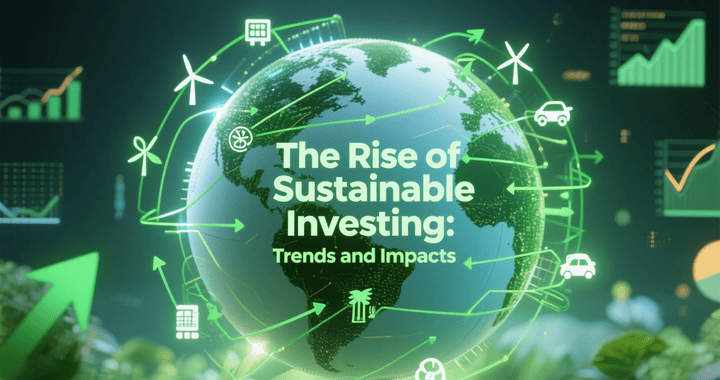The Rise of Sustainable Investing: Trends and Impacts

Sustainable investing has gained significant traction in recent years, reflecting a growing awareness among investors about the importance of environmental, social, and governance (ESG) criteria. This article delves into the trends driving sustainable investing, the impact on traditional investment strategies, and the broader implications for the financial market.
Understanding Sustainable Investing
Sustainable investing refers to the practice of making investment decisions based on ESG factors alongside traditional financial metrics. This approach aims to generate positive social and environmental outcomes while achieving financial returns. Key components of sustainable investing include:
Environmental: Considerations related to climate change, resource depletion, waste management, and pollution.
Social: Factors that address human rights, labor practices, community impact, and diversity.
Governance: Issues concerning corporate governance, executive pay, board diversity, and shareholder rights.
Key Trends in Sustainable Investing
Increased Demand for ESG Investments: Investors, particularly millennials and Gen Z, are prioritizing sustainability in their investment choices. This demographic shift is prompting asset managers to develop more ESG-focused products.
Regulatory Changes: Governments and regulatory bodies worldwide are introducing guidelines and regulations that promote transparency in ESG reporting. These changes aim to enhance accountability and encourage companies to adopt sustainable practices.
Integration of ESG in Investment Strategies: More investment firms are incorporating ESG factors into their decision-making processes. This trend reflects a recognition that sustainable practices can lead to better long-term financial performance.
Rise of Impact Investing: Impact investing, which seeks to generate measurable social or environmental impacts alongside financial returns, is becoming increasingly popular. Investors are looking for opportunities that align with their values and contribute positively to society.
Technological Advancements: Innovations in technology, such as data analytics and blockchain, are enhancing the ability to measure and report on ESG performance. These tools help investors make informed decisions based on reliable data.
Implications for Traditional Investment Strategies
The rise of sustainable investing is reshaping traditional investment strategies in several ways:
Shift in Risk Assessment: Investors are recognizing that ESG factors can significantly affect a company's risk profile. Companies with strong ESG practices are often seen as more resilient and better positioned for long-term success.
Portfolio Diversification: Sustainable investing encourages diversification into sectors such as renewable energy, sustainable agriculture, and clean technology, which may offer growth opportunities that traditional sectors do not.
Long-Term Value Creation: Investors are increasingly focused on long-term value creation rather than short-term gains. Sustainable investing aligns with this philosophy by promoting practices that benefit society and the environment over time.
Challenges and Considerations
Despite its growth, sustainable investing faces several challenges:
Greenwashing: Some companies may exaggerate their ESG commitments or misrepresent their practices to attract investment. Investors must conduct thorough due diligence to identify genuinely sustainable companies.
Data and Reporting Standards: The lack of standardized ESG reporting frameworks can make it difficult for investors to compare companies' sustainability efforts. Improved transparency and consistency in reporting are needed.
Performance Concerns: While many studies show that sustainable investments can perform well, some investors remain skeptical about potential trade-offs between social responsibility and financial returns.
Conclusion
The rise of sustainable investing represents a significant shift in how investors approach their portfolios. By prioritizing ESG criteria, investors are not only addressing pressing global challenges but also positioning themselves for long-term financial success. As the demand for sustainable investment options continues to grow, the financial industry must adapt to meet these evolving expectations. Embracing sustainable investing is not just a trend; it is a critical component of a responsible and forward-thinking investment strategy.
